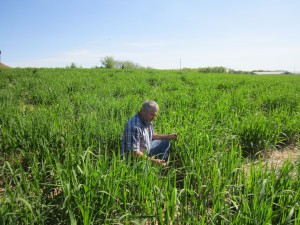
Missouri producer, Chris Holliday, diversified his operation by growing miscanthus which he delivers to a biomass company that processes the crop into an additive used in pet foods and treats.
By: Dana Rogge, Missouri Public Affairs and Outreach Specialist
Taking chances and trying new things is not new to Cooper County, Missouri, farmer Chris Holliday. In 2011, the diversified row-crop producer and contract turkey grower found opportunity in an unusual new crop, miscanthus. Miscanthus is a crop grown as a possible renewable fuel source; however, Holliday’s crop also may be fueling your pet – – as a fiber additive in dog food and treats.
A little different from the corn, soybeans and wheat he is accustomed to producing, Holliday felt he had a reasonable chance of enhancing his operation while being a part of an emerging biomass industry.
Miscanthus is a perennial warm season grass that is well suited for Missouri’s climate and soil types. What looks almost like an ornamental grass you would find in landscaping, miscanthus can reach over 10 feet in height.
Holliday began the process of preparing his ground for planting in the fall of 2011, with the rhizomes planted in the spring of 2012. He harvested his first crop the winter of 2013-2014. Holliday took a leap of faith, not only with a new crop, but also with the investment in time it would take to realize a crop.
“It takes at least two years to get a partial crop, depending on the weather and weed pressure,” Holliday said. “Starting off with a clean field means everything.”
Once the crop is harvested (a process similar to baling hay), Holliday delivers it to Renew Biomass, a manufacturing facility in southwest Missouri. It is then processed and marketed as an all-natural, non-GMO, grain and gluten-free, dietary fiber additive to pet foods. The processed miscanthus provides an alternative to sugar beet pulp or cellulose powder.
“I think it just gives the consumer more choices when it comes to buying products that fit their lifestyle, from dog food to the next use they find for it,” Holliday said.
Holliday says he has also seen environmental benefits on his farm. Miscanthus can be planted on ground that may not be productive for other crops and has shown to be beneficial to the land itself by requiring minimal soil disturbance and decreasing soil erosion.
“From what I have seen where this has been planted, the root mass is so big, I feel it is building up my soils with organic matter,” Holliday said.
USDA’s Farm Service Agency (FSA) assists producers like Holliday to establish eligible biomass crops through the Biomass Crop Assistance Program (BCAP). BCAP provides cost-share assistance for establishing new biomass crops that can be used for energy or biobased products, providing incentives for farmers and ranchers in several counties in Missouri to grow miscanthus.
“Without the BCAP program stepping up to help get this started, I would have never done this on my own – there were too many risks for an unknown crop,” Holliday said. “BCAP gave me the security and I felt I needed to give it a try.”
To learn more about BCAP, visit www.fsa.usda.gov/bcap. And to learn more about how USDA is investing in the biobased economy, visit www.biopreferred.gov or click here.





